Animal Facts
Can Rats Eat Cherries? A Guide to Rats Enjoying Cherries Safely
Gather insights on whether rats can indulge in cherries, uncovering the benefits and precautions, to safeguard your furry friend's well-being.
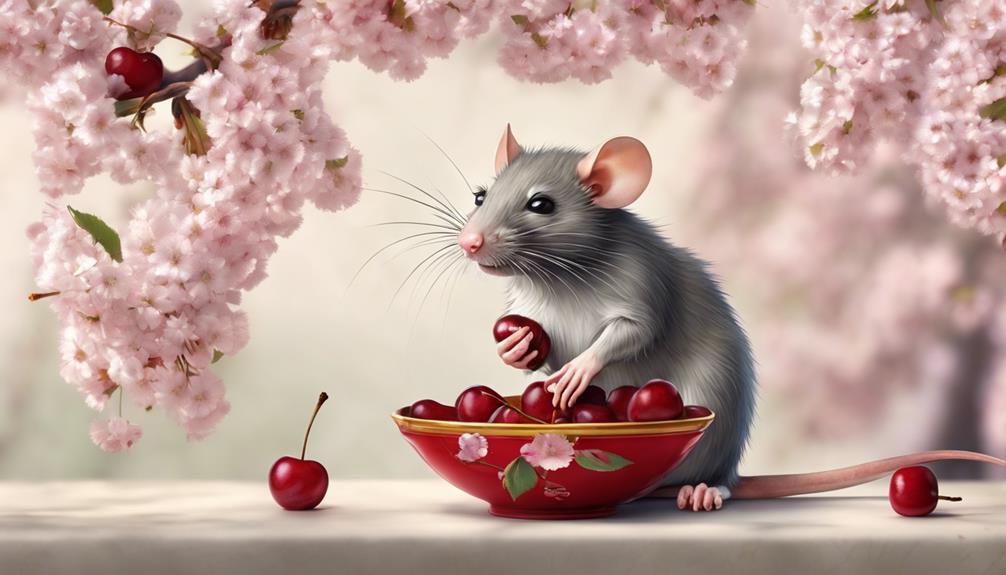
Cherries can be a tasty and nutritious snack for our furry companions when given in moderation and with caution. These fruits provide essential nutrients such as vitamin C and potassium that can improve a rat’s overall health. It is important to remove the pits to avoid any risk of cyanide poisoning. Restricting the consumption of cherries to one or two per week for adult rats can help prevent problems like obesity and diabetes.
To learn more about ensuring your rats enjoy cherries safely, keep exploring the benefits and precautions associated with these delightful fruits.
Key Takeaways
- Remove cherry pits to prevent cyanide toxicity in rats.
- Limit cherry intake to one or two per week for adult rats.
- Watch for allergic reactions after feeding cherries to rats.
- Consider cherries as a treat, not a regular part of the diet.
- Cautiously incorporate cherries to minimize associated risks.
Cherry Nutritional Profile for Rats
Cherries offer a diverse nutritional profile that plays a crucial role in supporting the health and well-being of rats. These fruits are packed with essential nutrients like vitamin C, which acts as a powerful antioxidant, boosting rats' immune systems and protecting their cells from damage. Additionally, cherries are a rich source of potassium, aiding in regulating blood pressure levels in rats and supporting heart health.
Moreover, the fiber content in cherries is beneficial for rats' digestive systems, promoting healthy gut function and aiding in lowering cholesterol levels. The presence of antioxidants such as anthocyanins and quercetin further enhances the health benefits of cherries for rats, contributing to their overall wellness.
Benefits and Risks of Cherries
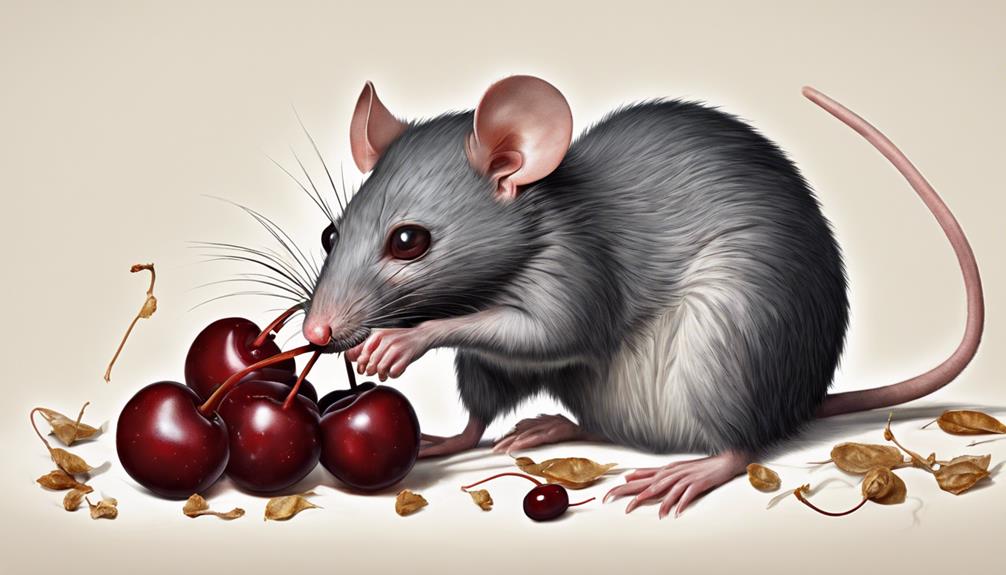
Exploring the nutritional impact of cherries on rats reveals a spectrum of benefits and risks that warrant careful consideration for their well-being. Cherries provide essential nutrients like vitamin C, potassium, and manganese, contributing to a healthy diet for rats. The antioxidants present in cherries play a crucial role in boosting rats' immune systems and reducing inflammation, promoting overall well-being.
Additionally, the fiber content in cherries aids in digestion and supports cardiovascular health in rats. However, it's vital to note that cherry pits contain cyanide, which is toxic to rats. Therefore, it's imperative to remove pits before feeding cherries to these animals. To maintain a healthy balance, it's recommended to feed adult rats cherries in moderation, limiting intake to one or two per week.
This precaution helps prevent potential risks such as weight gain and diabetes. By incorporating cherries into their diet cautiously, rats can reap the benefits of this nutritious fruit while minimizing associated dangers.
Safe Feeding Practices for Rats
When feeding rats, it's crucial to remove cherry pits to prevent cyanide toxicity and limit their intake to one or two per week to avoid potential health issues such as weight gain and diabetes.
Here are some safe feeding practices for rats:
- Remove pits: Always take out the pits before offering cherries to your rats to prevent any potential cyanide toxicity.
- Limit intake: For adult rats, it's best to limit cherry consumption to one or two per week to prevent health issues like weight gain and diabetes.
- Watch for allergies: Keep an eye out for allergic reactions such as itching, swelling, or difficulty breathing after feeding cherries as some rats may be sensitive.
- Moderation is key: Cherries should be considered a treat and not a significant part of your rat's diet to avoid potential health problems in the long run.
Alternative Fruit Options for Rats
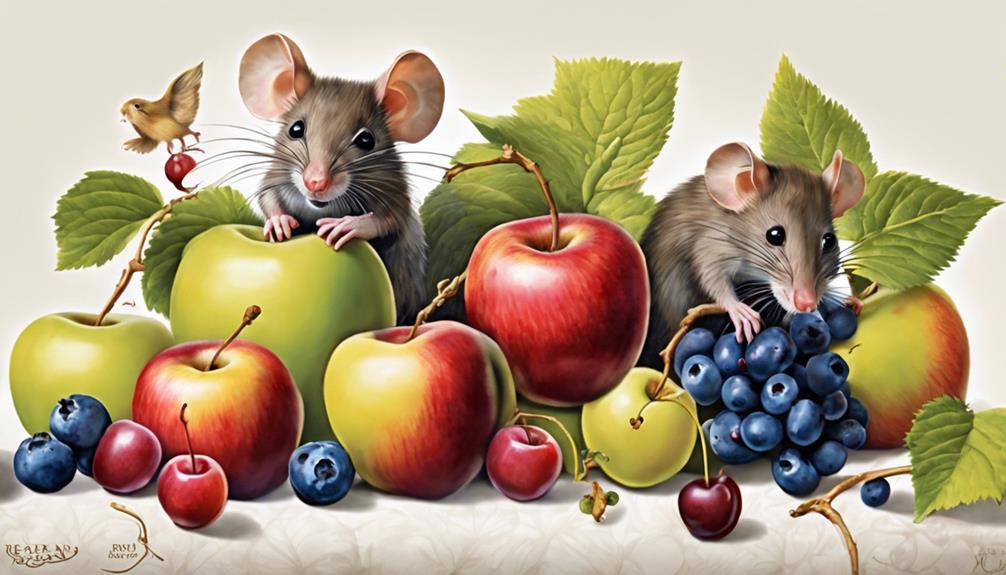
After discussing safe feeding practices for rats, it's important to consider alternative fruit options that provide a variety of nutrients for these small pets.
While cherries are a great source of vitamins and antioxidants for rats, there are other fruits that can also benefit their diet. Apples are rich in fiber and vitamin C, supporting a healthy gut for your rats. Bananas, high in potassium and easily digestible, make for a tasty treat. Pears, containing fiber and vitamin C, can be fed with or without the skin to add variety. Blueberries, packed with antioxidants and vitamin C, are safe for rats whether fresh or frozen.
It's important to note that fruits like apples, bananas, pears, and blueberries should be fed in moderation due to their natural sugar content. Remember to avoid feeding your rats cherry pits as they contain cyanide, which is toxic to them. By offering a mix of these fruits, you can ensure a balanced diet for your beloved rats.
Common Questions About Rats and Cherries
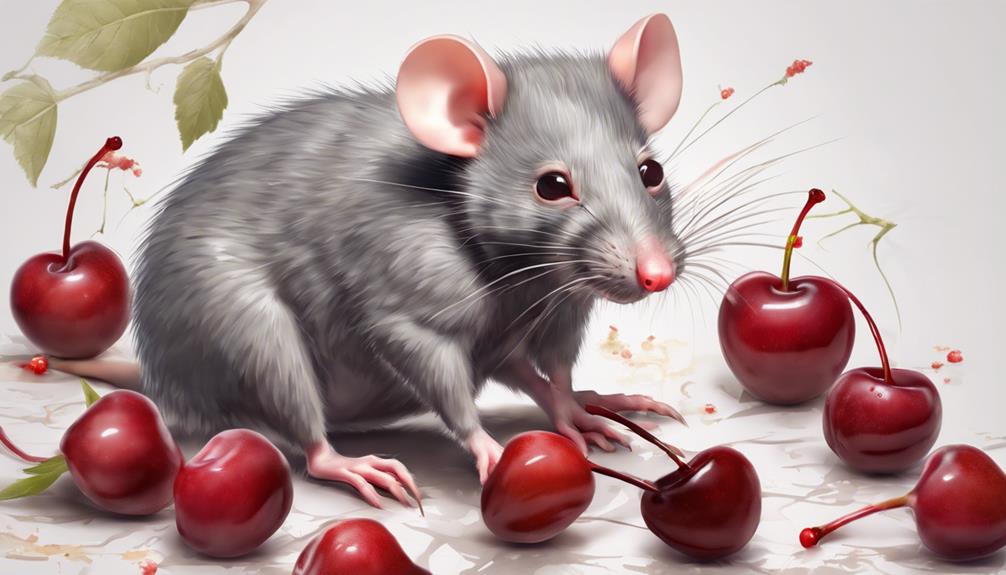
Let's delve into some common queries about rats and cherries to clarify any uncertainties pet owners may have regarding the safety and benefits of this fruit for their furry companions.
- Can rats eat cherries with pits? It's crucial to remove the pits before feeding cherries to rats, as they contain cyanide, which can be toxic to rats and lead to health problems.
- Are cherries healthy for rats? Cherries are a great source of fiber and antioxidants, making them a beneficial treat for rats when given in small amounts.
- How often can I feed cherries to my rats? Limit cherry consumption to one or two per week for adult rats to prevent any potential health issues associated with the high levels of sugar in fruits.
- What are the benefits of feeding cherries to rats? Feeding cherries in moderation can help boost rats' immune systems and contribute to their overall health and well-being.
Frequently Asked Questions
Can You Feed Rats Cherries?
Yes, we can feed rats cherries in moderation. Cherries without pits are safe, offering fiber benefits. Limit to one cherry per rat every other day.
Staining is normal around the mouth and paws. While cherries are a nice treat, they shouldn't replace the main diet.
Be mindful of cyanide risks from pits. Cherries can be a delightful addition to a rat's diet when given thoughtfully and in appropriate amounts.
What Is a Rats Favorite Fruit?
Our pet rats have diverse taste preferences when it comes to fruits. While some may gravitate towards apples, bananas, or berries, others might've a sweet tooth for cherries or strawberries.
In our experience, offering a variety of fruits is key to discovering each rat's favorite. Each rat has unique likes and dislikes, making it exciting to see which fruit they'll enjoy the most.
What Is Most Toxic to Rats?
Absolutely, the most toxic substance for rats is cyanide, which can be found in certain foods like cherry pits. For rats, ingesting cyanide can lead to severe health complications and even death.
It's crucial to be vigilant and ensure that any potential sources of cyanide, such as cherry pits, are kept far away from our furry friends.
Being aware and proactive about toxic substances is essential for safeguarding our rats' well-being.
What Fruits Do Rats Not Like?
We've noticed that rats may not be big fans of citrus fruits like oranges or grapefruits due to their strong taste.
Some rats might also steer clear of mangoes because of their messy texture.
Pineapples or papayas could be less appealing to rats because of their tropical flavors.
Additionally, kiwi fruit's tartness mightn't be a hit with certain rats.
Lastly, fruits with strong aromas like durian or jackfruit may not pique a rat's interest.
Is It Safe to Feed Rats Other Fruits and Vegetables Besides Cherries and Broccoli?
Yes, you can safely feed rats broccoli, but it’s important to give them a variety of fruits and vegetables in moderation. Rats can also enjoy fruits like apples, bananas, and strawberries, as well as veggies like carrots, lettuce, and peas. Just be mindful of their sugar and sodium intake.
Conclusion
In conclusion, cherries can be a tasty and nutritious treat for rats when fed in moderation and with caution. While they offer benefits like antioxidants and vitamins, there are also risks such as pits and high sugar content.
By following safe feeding practices and considering alternative fruit options, you can ensure your furry friends enjoy cherries safely. Keep your rats happy and healthy by treating them to a variety of fruits in their diet.
Laura is a versatile writer and editor whose passion for animals shines through in her work. With a keen understanding of language and a love for storytelling, Laura crafts compelling narratives that captivate our audience and inspire action regarding animal welfare. Whether she’s delving into the latest research or sharing heartwarming stories of animal companionship, Laura’s work will leave a lasting impression on all who read it.
Animal Facts
5 Fascinating Animals Without Tails
Get ready to explore the world of tailless wonders with gorillas, chimpanzees, and more mysterious creatures that will leave you in awe.

Prepare to be impressed by animals that break the norm by thriving without tails. From tailless primates such as gorillas and chimpanzees with intricate social structures to intelligent dolphins displaying their playful nature, these creatures are sure to captivate your attention.
Pangolins covered in protective scales and facing endangerment, gentle manatees gracefully traversing waters, and spiders showcasing intricate adaptations are also part of this tailless wonders list. Stay tuned to discover more fascinating details about these incredible tailless animals.
Key Takeaways
- Dolphins are highly intelligent creatures with no tails, known for complex problem-solving skills and communication abilities.
- Pangolins, covered in protective scales, face extinction due to illegal poaching, making conservation efforts crucial.
- Manatees, gentle herbivores without tails, are vulnerable to threats like boat strikes and habitat loss, requiring protection.
- Spiders, diverse arachnids, use silk for web-building and prey capture, showcasing unique adaptations and intricate behaviors.
- Primates like gorillas and chimpanzees are tailless, displaying remarkable intelligence and complex social behaviors.
Primates
In the domain of tailless animals, primates stand out for their remarkable intelligence and intricate social dynamics. Tailless primates, such as gorillas, chimpanzees, bonobos, and orangutans, showcase a myriad of complex social behaviors that mirror our own. The absence of a tail in primates has driven their evolution towards bipedal locomotion, allowing for upright posture, which has further facilitated their tool use for problem-solving. These fascinating creatures have adapted to diverse environments in Africa and Southeast Asia, demonstrating their resilience and versatility.
Among the tailless primates, gibbons are particularly known for their acrobatic abilities and distinctive vocalizations in the wild. Their swinging prowess through the treetops is a sight to behold. Additionally, primates without tails engage in various behaviors, from intricate grooming rituals that strengthen social bonds to establishing complex social hierarchies within their groups. Observing these intelligent creatures navigate their social worlds offers a glimpse into the intricate tapestry of relationships and behaviors that define their existence.
Dolphins

Dolphins, renowned for their intelligence and social nature, possess a unique horizontal fluke for propulsion instead of a visible external tail. These marine mammals exhibit intriguing behavior and engage in intricate social interactions that fascinate observers worldwide.
Here are some fascinating facts about dolphins:
- Dolphins are highly intelligent creatures, displaying complex problem-solving skills and communication abilities.
- Their playful behavior often involves riding waves, leaping out of the water, and engaging in games with other dolphins.
- Social interactions among dolphins are essential for their survival, as they rely on cooperation and communication within their pod.
- The horizontal fluke of dolphins serves as a powerful propulsion mechanism, allowing them to move swiftly and gracefully through the water.
Through the combination of their streamlined bodies, powerful muscles, and unique fluke structure, dolphins showcase efficient swimming techniques and remarkable acrobatic prowess, making them truly captivating marine animals.
Pangolins
Gracefully gliding through their habitats, pangolins captivate with their unique features and behaviors. These unique mammals are covered in protective keratin scales, making them resemble walking artichokes. Their long, sticky tongues are perfectly adapted for capturing ants and termites, their favorite delicacies.
Unfortunately, pangolins are facing a grave threat – illegal poaching. The demand for their scales and meat has pushed them to the brink of extinction, with all eight species, spread between Africa and Asia, endangered.
Conservation efforts are paramount in safeguarding these fascinating creatures. Initiatives to combat the illegal wildlife trade are essential for the survival of pangolins. Raising awareness about the plight of these gentle animals is vital, as is enforcing stricter laws to protect them. Without immediate action, pangolins may disappear from the wild forever.
It's up to us to make sure that these marvelous creatures continue to roam our forests and savannas, adding their unique charm to the tapestry of nature.
Manatees

Swimming gracefully through the coastal waters and rivers of tropical and subtropical regions, manatees, also known as sea cows, are large, herbivorous marine mammals with distinctive paddle-like flippers and a rounded, tailless body shape. These gentle giants captivate with their unique features and behaviors:
- Gentle Herbivores: Manatees have a peaceful nature, feeding on aquatic plants in their watery habitats.
- Slow-Moving Giants: Despite their size, manatees move gracefully and slowly through the water.
- Vulnerable Creatures: Due to their gentle demeanor and slow movements, manatees are susceptible to threats like boat strikes.
- Conservation Concerns: Ongoing efforts to protect manatees and their habitats from dangers like habitat loss and human activities.
Manatees, with their endearing characteristics and vulnerable status, remind us of the importance of safeguarding these magnificent marine mammals through dedicated conservation initiatives.
Spiders
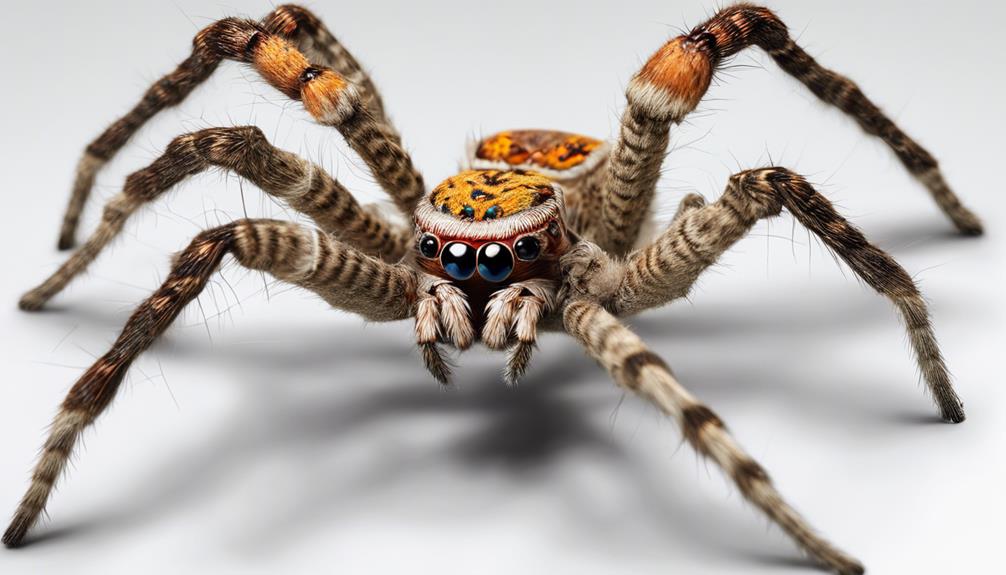
Intriguing for their arachnid characteristics, spiders captivate with their diverse species and unique adaptations for survival in various habitats.
Spiders, belonging to the arachnid family, are renowned for their eight legs and the absence of a tail. They produce silk for various purposes, including web-building, prey capture, and constructing shelters. Utilizing venom to subdue their prey, spiders possess specialized hunting techniques that vary among species.
Some spiders exhibit intricate mating behaviors and display remarkable parental care, a surprising trait for creatures often associated with solitude. Despite their lack of a tail, spiders thrive in diverse environments, showcasing a remarkable array of adaptations.
From the intricate webs of orb-weavers to the stealthy ambush tactics of jumping spiders, each species contributes uniquely to the intricate tapestry of the natural world. The world of spiders is a fascinating domain where survival, reproduction, and innovation intersect in enthralling ways.
Frequently Asked Questions
What Kind of Animals Have No Tails?
We explore tailless animals like snakes, turtles, birds, apes, and whales. Taillessness can stem from various reasons like evolution, specialized movement, balance needs, environment factors, or survival benefits. These creatures display unique traits and habitats.
What Animal Has 4 Legs but No Tail?
We found an animal that has four legs but no tail. It's the Manx cat! This unique breed boasts a genetic mutation giving it a tailless charm. Despite lacking a tail, Manx cats are playful, affectionate, and agile.
Why Capybara Doesn T Have a Tail?
We don't have tails because we're capybaras, adapted herbivores thriving in wetlands. Our taillessness is natural, not a mutation or injury. We use strong social bonds and swimming skills to compensate effectively.
What Rodent Does Not Have a Tail?
It's common knowledge that the Tiliqua rugosa, a captivating rodent indigenous to Australia, lacks a tail. However, this tailless skink's distinctive adaptation of utilizing its stubby tail as a fat reserve demonstrates its incredible survival skills and adaptability.
Are Any of the Animals Without Tails in the List of Nature’s Oddities?
When unveiling nature’s oddities, it’s interesting to note that some animals are indeed tailless. Examples include the Manx cat, some breeds of dogs such as the Australian Stumpy Tail Cattle Dog, and certain species of lizards and insects. These tailless creatures definitely stand out in the animal kingdom.
Conclusion
To sum up, these tail-less creatures showcase the diverse adaptations found in the animal kingdom.
From the agile primates swinging through trees to the graceful dolphins gliding through the water, each species has evolved unique ways to thrive without a tail.
Observing these fascinating animals in their natural habitats provides a vivid glimpse into the intricate web of life on Earth, where every creature plays a crucial role in the ecosystem's balance.
Paul’s love for animals knows no bounds. As a dedicated writer and animal lover, Paul brings a unique perspective to our team. His firsthand experiences with various animals enrich our content and provide valuable insights into their behavior and needs. Whether he’s sharing tips for pet care or shedding light on pressing conservation issues, Paul’s passion for animals shines through in everything he does.
Animal Facts
Animals That Live in a Lake: Exploring Aquatic Wildlife
Prepare to be captivated by the diverse and colorful aquatic wildlife in lakes, from graceful pelicans to mysterious pike – a fascinating world awaits!

We discovered a range of fascinating aquatic animals that thrive in lakes. Among them are the adaptable ducks with webbed feet, the crucial lake trout in North American ecosystems, and the vibrant flamingos that add color to lakeshores. These creatures are important for biodiversity and help to keep the delicate balance of freshwater environments.
Explore further to uncover more about the enchanting wildlife that calls lakes home.
Key Takeaways
- Ducks with webbed feet are well-adapted to lake life.
- Lake trout are crucial in North American lake food chains.
- Salamanders play a significant role in lake ecosystems.
- Flamingos bring colorful beauty to lakeshores.
- Lakes host a diverse array of thriving freshwater life.
Freshwater Lake Animals
Freshwater lakes harbor a remarkable diversity of aquatic fauna, encompassing 41% of fish species and a myriad of unique animals such as beavers, frogs, electric eels, hurons, and dragonflies.
These animals play essential roles in the freshwater ecosystem, each adapted to live in the specific conditions provided by the lakes. Fish species like trout and bass thrive in the clear waters, while beavers construct intricate dams that shape the landscape.
Frogs can be spotted near the water's edge, their calls echoing through the tranquil surroundings. Electric eels, though elusive, add a spark to the underwater world with their unique abilities.
Hurons, with their graceful movements, navigate the waters effortlessly, preying on smaller fish. Dragonflies flit about, adding splashes of color to the lakeside scenery. Together, these animals create a vibrant tapestry of life within freshwater lakes, highlighting the intricate interconnectedness of this aquatic habitat.
Saltwater Lake Animals

In saltwater lakes, an array of fish species, such as clownfish, grouper, and pufferfish, thrives amidst the crucial salinity environment, showcasing unique adaptations for survival. These creatures have evolved specialized mechanisms to regulate their internal salt levels, enabling them to live in waters that would be inhospitable to many other freshwater animals. The table below highlights some of the fascinating saltwater lake animals and their distinctive features:
| Saltwater Lake Animals | Unique Adaptations | Habitat |
|---|---|---|
| Clownfish | Ability to live among sea anemones | Coral reefs |
| Grouper | Camouflaging techniques | Rocky crevices |
| Pufferfish | Inflating when threatened | Sandy bottoms |
Saltwater lakes provide crucial ecosystems for these fish species and many others, contributing to the rich marine biodiversity found in these unique habitats. The interactions between these animals and their environment shape the delicate balance of life in saltwater and freshwater habitats, highlighting the importance of preserving these aquatic ecosystems for future generations.
Semiaquatic Animals
Semiaquatic animals, encompassing amphibians, reptiles, and select mammals, navigate their existence in both terrestrial and aquatic domains, showcasing a diverse array of adaptations tailored to their dual habitat lifestyle.
River otters, with their streamlined bodies and webbed feet, elegantly glide through freshwater habitats, preying on fish and crustaceans while also foraging on land.
Painted turtles, known for their colorful shells, bask on logs in the sun to regulate body temperature before gracefully swimming to hunt for aquatic plants and small invertebrates.
Water snakes, equipped with bony plates for buoyancy and powerful muscles for swimming, stealthily patrol the shallows, preying on fish and amphibians.
Aquatic salamanders, such as the spotted salamander, exhibit fascinating larval stages in water before metamorphosing into adults that navigate both land and water, contributing to the intricate food webs of lake ecosystems.
These semiaquatic species play crucial roles in maintaining the delicate balance of freshwater ecosystems, highlighting the interconnectedness of life both above and below the water's surface.
Animals That Live in a Lake

Ducks, lake trout, salamanders, flamingos, and various other species populate lakes worldwide, forming diverse and intricate ecosystems. Ducks, with their distinctive webbed feet, are well-adapted to freshwater habitats. Lake trout, known for their pivotal role in the food chain of North American lakes. Salamanders, often overlooked, contribute substantially to the balance of lake ecosystems by regulating insect populations and serving as prey for larger predators. In contrast, flamingos add a splash of color to lakeshores, feasting on small crustaceans with their uniquely curved bills.
These aquatic wildlife species showcase the rich tapestry of life that thrives in freshwater environments. Each species holds a specific place within the intricate web of interactions that sustain the delicate balance of lake ecosystems. From the graceful movements of ducks gliding across the water to the stealthy hunt of lake trout lurking in the depths, these diverse inhabitants collectively shape the dynamic nature of lakes around the world.
What Do Animals That Live in Lakes Eat?

Among the diverse array of animals inhabiting lakes worldwide, their dietary preferences encompass a wide range of foods, including:
- Fish: Predatory fish such as pike and bass dominate the food chain, preying on smaller fish and invertebrates for sustenance. These important fish species play a critical role in regulating the lake's ecosystem by controlling the population of other aquatic creatures.
- Insects: Various insects serve as a crucial food source for many lake-dwelling animals, including fish, birds, and amphibians. Mosquito larvae, for example, are a favorite snack for fish like bass, contributing to the delicate balance of the lake's food web.
- Aquatic Plants: Herbivorous animals like ducks and swans rely on aquatic plants and algae as their primary diet. Grazing on these plant species not only sustains these herbivores but also helps in controlling the growth of vegetation within the lake.
- Small Mammals: Some lakes are home to small mammals like muskrats and otters that feed on a variety of foods, including fish, crustaceans, and aquatic plants. These omnivorous creatures play a significant role in shaping the biodiversity of the lake environment.
Frequently Asked Questions
What Type of Animals Live in the Lake?
We observe a variety of animals in lakes – from fish like trout and pike to diverse wildlife such as beavers, ducks, and dragonflies. These creatures interact within the lake ecosystem, showcasing a delicate balance of life.
What Are the Animals That Live in the Water?
In the water, we find a diverse array of animals such as fish, turtles, and frogs. They thrive in aquatic environments, adapting to the challenges and opportunities presented by lakes, rivers, and oceans.
What Kind of Marine Life Lives in Lake Michigan?
In Lake Michigan, over 30 fish species like lake trout, salmon, and yellow perch thrive. The ecosystem also includes freshwater mussels, crayfish, and algae. Birds such as seagulls, ducks, and cormorants contribute to the lake's biodiversity. Invasive species like zebra mussels and round gobies impact the native marine life.
What Kind of Animals Live in a Pond?
In ponds, diverse creatures like frogs, turtles, dragonflies, and fish thrive. Birds, including ducks and herons, flock for food and nesting. Aquatic plants offer shelter and sustenance. Ponds, akin to bustling cities, teem with life, interconnected in a delicate ecosystem.
What Kind of Aquatic Wildlife Can Be Found in Mountain Lakes?
When exploring mountain lakes, you might spot a variety of aquatic creatures. From elusive freshwater fish like the golden trout to amphibians like the American dipper, the alpine mountain wildlife guide is filled with fascinating creatures. Keep an eye out for otters, beavers, and even rare dragonflies in these high altitude lakes.
Conclusion
To sum up, the diverse array of animals that live in lakes showcases the incredible adaptability and resilience of aquatic wildlife.
From freshwater to saltwater environments, these creatures have evolved unique characteristics to thrive in their watery habitats.
By understanding what these animals eat and how they interact with their surroundings, we can gain a deeper appreciation for the intricate ecosystem of lakes and the crucial role these creatures play in maintaining balance and harmony within their underwater world.
Paul’s love for animals knows no bounds. As a dedicated writer and animal lover, Paul brings a unique perspective to our team. His firsthand experiences with various animals enrich our content and provide valuable insights into their behavior and needs. Whether he’s sharing tips for pet care or shedding light on pressing conservation issues, Paul’s passion for animals shines through in everything he does.
Animal Facts
What Animal Looks Most Like a Squirrel?
Uncover fascinating creatures resembling squirrels, from chipmunks to marmots and prairie dogs, showcasing unique similarities and connections in the animal kingdom.
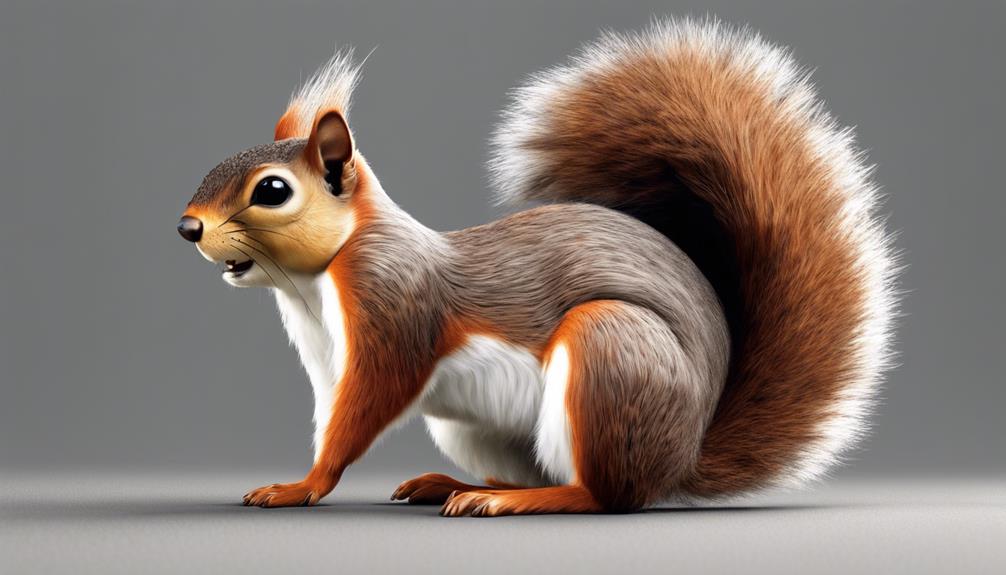
When searching for animals that resemble squirrels, creatures such as chipmunks, marmots, and prairie dogs are among the top contenders. Chipmunks are small with striped patterns and bushy tails, famous for storing food like squirrels. Marmots are larger ground-dwelling rodents with furry coats and bushy tails, some growing up to 2 feet in size. Prairie dogs, especially the Black-tailed and Gunnison’s species, with their underground burrows and social nature, also display squirrel-like features. These animals demonstrate behaviors and physical traits similar to squirrels, highlighting their interconnectedness in ecosystems.
If you're intrigued by these similarities, there's more to uncover about other rodents resembling squirrels and exotic pets with squirrel-like features.
Key Takeaways
- Chipmunks share squirrel-like features with distinctive stripes and bushy tails.
- Marmots resemble squirrels in size and bushy tails, with burrowing habits.
- Black-tailed Prairie Dogs exhibit squirrel-like characteristics in appearance and behavior.
- Rodents like marmots, chipmunks, and prairie dogs show similarities to squirrels.
- Exotic pets like Sugar Gliders and Chinchillas have features akin to squirrels for unique options.
Chipmunks: The Squirrel Lookalikes
Chipmunks, small rodents closely resembling squirrels in appearance and behavior, exhibit a striking resemblance that extends beyond their physical attributes to their nesting habits and foraging techniques. These creatures, part of the squirrel family, boast bushy tails and distinctive striped patterns akin to tree squirrels. While their tails are shorter, chipmunks share the squirrel's propensity for food caching, storing nuts and seeds for later consumption. Nest builders by nature, some chipmunk species, such as the Lodgepole Chipmunk, construct intricate burrows for shelter and protection.
What sets chipmunks apart is their adept climbing skills, effortlessly maneuvering through trees much like their squirrel cousins. Observing these small mammals scurrying up branches with agility is a reflection of their evolutionary adaptations. The similarities between chipmunks and tree squirrels aren't merely superficial; they run deep in their genetic makeup and behavioral patterns. Studying these tiny creatures provides a fascinating glimpse into the interconnectedness of nature within the squirrel family.
Marmots: Nature's Squirrel Twins

Closely resembling squirrels in appearance and behavior, marmots are larger ground-dwelling rodents known for their furry coats and bushy tails. These creatures, akin to tree squirrels, exhibit striking physical similarities, making them nature's squirrel twins.
Marmots, with their penchant for constructing underground burrows like their squirrel counterparts, engage in behaviors such as food caching and alarm calls. The Hoary Marmot, a notable species, can reach impressive sizes of up to 2 feet in length and weigh as much as 8 pounds, mirroring the stature of large squirrels.
Through their shared evolutionary history and habitat preferences, marmots and squirrels have intertwined proofs, standing as evidences to the wonders of nature's design. The evolutionary parallels between these ground-dwelling rodents and arboreal squirrels provide a fascinating glimpse into the intricate tapestry of the animal kingdom, where similarities in form and function blur the lines between species.
Prairie Dogs: Squirrel Impersonators
Resembling squirrels both in appearance and behavior, prairie dogs are intriguing creatures that exhibit striking similarities to their arboreal counterparts. These social herbivores, such as the black-tailed and Gunnison's species, dwell in underground burrows akin to squirrel nests. The black-tailed prairie dogs sport small frames complemented by long tails, while their Gunnison's counterparts boast larger bodies with bushy tails and elongated hind legs. Utah prairie dogs, another member of this squirrel impersonator group, feature petite sizes and fluffy tails, sharing a penchant for burrowing just like squirrels.
Observing prairie dogs in their natural habitat reveals their communal nature and herbivorous diet, further mirroring squirrel behavior. The intricate network of burrows they create underground not only serves as shelter but also as a hub for social interactions, much like squirrel communities in trees. With their distinct physical attributes and lifestyle choices, prairie dogs stand out as fascinating creatures that closely resemble squirrels in various aspects.
Rodents Resembling Squirrels
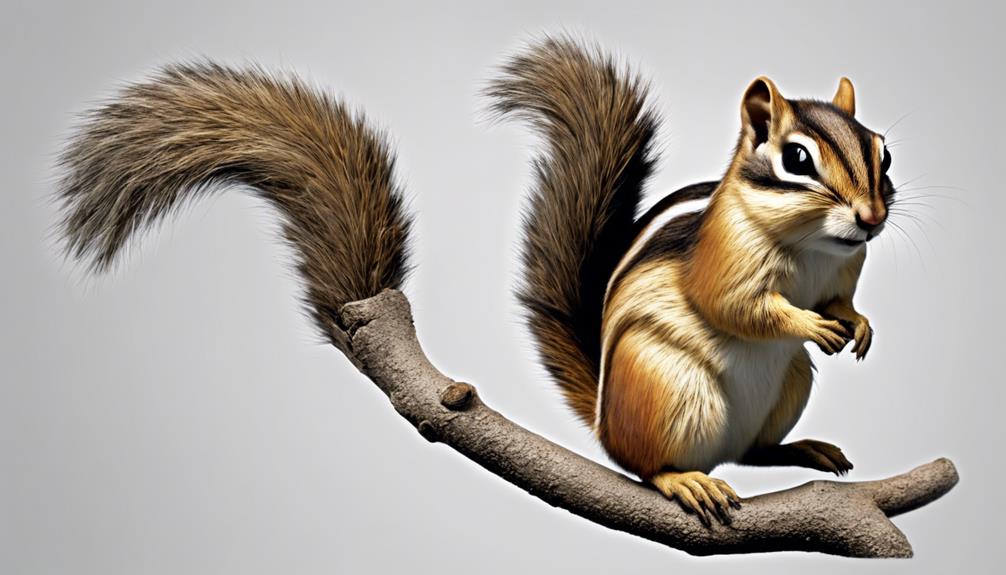
In the domain of rodent species sharing similarities with squirrels, marmots stand out for their substantial size and burrowing habits akin to those of tree-dwelling squirrels. These hoary marmots, also known as Alaska marmots, are commonly found in rocky slopes, echoing the habitats favored by many squirrel species. The marmot's resemblance to squirrels extends beyond their living arrangements, encompassing aspects of their physical appearance and behaviors.
Chipmunks, especially species like the Lodgepole chipmunks, Least Chipmunk, and Colorado chipmunk, exhibit striking similarities to squirrels with their small size, distinctive stripes, and cheek pouches for storing food. These traits closely mirror those of ground squirrels, further blurring the line between the two groups. Additionally, the Black-Tailed Prairie Dog shares squirrel-like characteristics such as a social nature, herbivorous diet, and preference for underground dwellings, reinforcing the interconnectedness of rodents resembling squirrels in various ecosystems.
Exotic Pets With Squirrel-Like Features

Observing the spectrum of exotic pets with squirrel-like features reveals a fascinating array of creatures that share intriguing resemblances to these nimble arboreal mammals. Among these fascinating animals are sugar gliders, Siberian chipmunks, chinchillas, and African dormice. These creatures offer unique pet options with similarities to squirrels, making them popular choices among enthusiasts.
| Exotic Pets | Resemblance to Squirrels | Unique Features |
|---|---|---|
| Sugar Gliders | Tree-dwelling marsupials with skin flaps for gliding | Active in the night |
| Siberian Chipmunks | Active during the day and live in trees | Not native to N.America |
| Chinchillas | Energetic and curious personalities similar to squirrels | Found in the Andes mountains |
| African Dormice | Small rodents with bushy tails resembling squirrels | Once popular pets in the U.S. |
These animals exhibit behaviors and physical traits that echo the charm and allure of squirrels, offering a unique experience for those looking to bring a touch of the wild into their homes.
Frequently Asked Questions
Which Animal Looks Like Squirrel?
We often observe animals resembling squirrels in various ways. From chipmunks with their stripes to prairie dogs' social behavior, and marmots' burrowing habits, nature presents a tapestry of creatures echoing the squirrel's traits.
What Animal Is Most Closely Related to Squirrels?
We observe marmots, close relatives of squirrels within the Sciuridae family. They share an evolutionary history dating back to the late Miocene Epoch. Physical traits and behaviors of marmots bear striking resemblances to squirrels, emphasizing their kinship.
What Is the Closest Thing to a Squirrel?
Well, the closest thing to a squirrel? Chipmunks! Those cheeky little critters with their food-stashing ways. They're like the squirrel's quirky cousin. Watch them scurry and stash, nature's little comedians.
What Rodent Looks Like a Small Squirrel?
We observed the question about a rodent resembling a small squirrel. The Lodgepole Chipmunk with its striped back, the Hoary Marmot's stout body, moles' velvety fur and paddled feet, and hamsters' short tails share similarities with squirrels.
Are Red Pandas Related to Squirrels in Any Way?
Yes, recognizing red panda behavior can offer some insight into their relationship with squirrels. While red pandas and squirrels are not closely related, they do share similar arboreal habitats and both are known for their agile climbing and tree-dwelling behaviors.
Conclusion
In the vast tapestry of the animal kingdom, we've uncovered creatures that mirror the charming squirrel in appearance and behavior.
From the chipmunks with their striped coats, to the marmots with their bushy tails, and even the prairie dogs with their social habits, nature has painted vivid portraits of squirrel doppelgangers.
These animals serve as reminders of the beauty and diversity that exist within our world, each one a unique thread in the intricate fabric of life.
Paul’s love for animals knows no bounds. As a dedicated writer and animal lover, Paul brings a unique perspective to our team. His firsthand experiences with various animals enrich our content and provide valuable insights into their behavior and needs. Whether he’s sharing tips for pet care or shedding light on pressing conservation issues, Paul’s passion for animals shines through in everything he does.
-
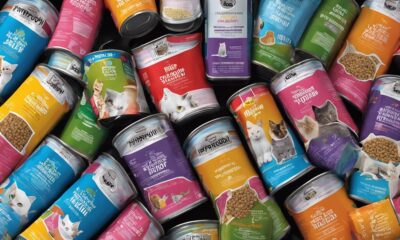
 Vetted2 months ago
Vetted2 months ago15 Best Cat Foods for Managing Hyperthyroidism – Vet Approved and Feline Friendly
-
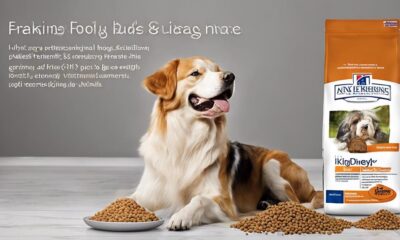
 Vetted2 months ago
Vetted2 months ago15 Best Dog Foods for Kidney Disease – Expert Recommendations for Your Pet's Health
-

 Vetted2 months ago
Vetted2 months ago15 Best Fresh Dog Food Delivery Services for Your Pup's Health and Happiness
-

 Animal Facts2 months ago
Animal Facts2 months agoSpring Animals: A Guide to Seasonal Wildlife
-
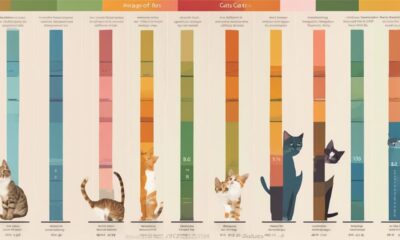
 Cats1 month ago
Cats1 month agoCat Weight Chart by Age: Kitten to Senior in Lbs
-
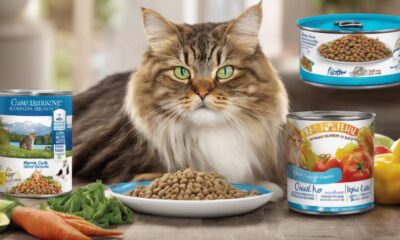
 Vetted2 months ago
Vetted2 months ago15 Best Wet Cat Foods for Older Cats to Keep Them Healthy and Happy
-

 Vetted2 months ago
Vetted2 months ago14 Best Homemade Dog Food Recipes Your Pup Will Love – Vet Approved & Nutritious
-

 Cats1 week ago
Cats1 week agoTop 5 Cat Breeders in Arkansas: A Guide





















